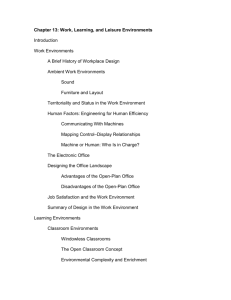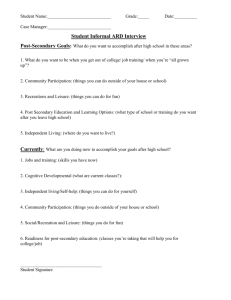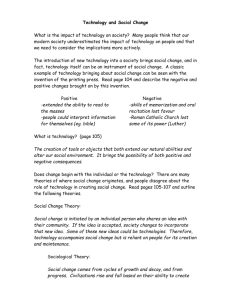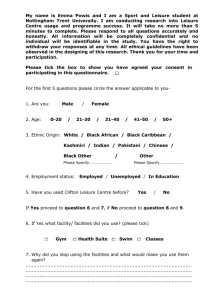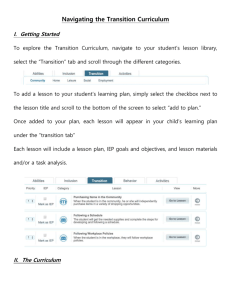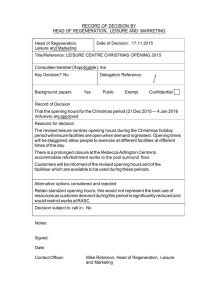REC5340 Social Psychology of Recreation and Leisure
advertisement
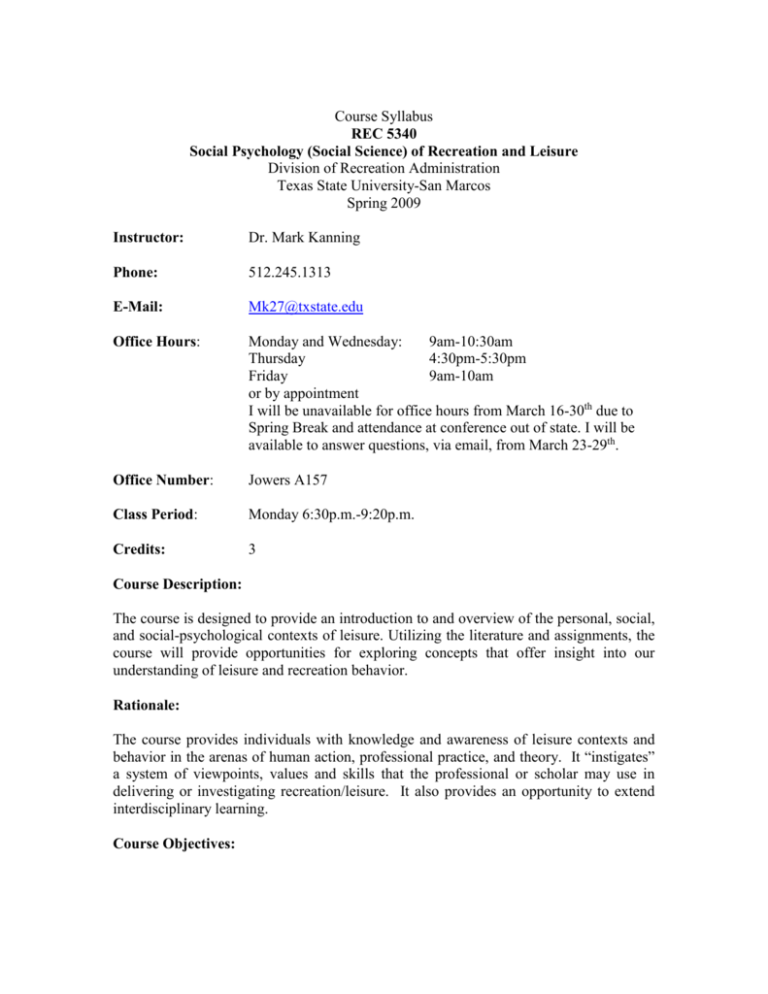
Course Syllabus REC 5340 Social Psychology (Social Science) of Recreation and Leisure Division of Recreation Administration Texas State University-San Marcos Spring 2009 Instructor: Dr. Mark Kanning Phone: 512.245.1313 E-Mail: Mk27@txstate.edu Office Hours: Monday and Wednesday: 9am-10:30am Thursday 4:30pm-5:30pm Friday 9am-10am or by appointment I will be unavailable for office hours from March 16-30th due to Spring Break and attendance at conference out of state. I will be available to answer questions, via email, from March 23-29th. Office Number: Jowers A157 Class Period: Monday 6:30p.m.-9:20p.m. Credits: 3 Course Description: The course is designed to provide an introduction to and overview of the personal, social, and social-psychological contexts of leisure. Utilizing the literature and assignments, the course will provide opportunities for exploring concepts that offer insight into our understanding of leisure and recreation behavior. Rationale: The course provides individuals with knowledge and awareness of leisure contexts and behavior in the arenas of human action, professional practice, and theory. It “instigates” a system of viewpoints, values and skills that the professional or scholar may use in delivering or investigating recreation/leisure. It also provides an opportunity to extend interdisciplinary learning. Course Objectives: 1. Understanding of the conceptual foundations of the sociology and psychology of the leisure phenomenon. 2. Ability to articulate objective and subjective needs of leisure in order to enhance programming. 3. Ability to record and analyze leisure behaviors in order to facilitate programming and management. 4. Utilize various information sources in accumulating and critically analyzing 5. Demonstrate knowledge of issues related to parks and recreation and their place in society 6. Understand the relationships between macro and micro level issues and their relevance to parks and recreation. 7. Understand the position of parks and recreation in relation to communities, local and global. Required Text: Mannell, R.C. and Kleiber, D. A. (1997). A Social Psychology of Leisure. State College, Pennsylvania: Venture. TBA- In relation to book reviews Recommended Text: Godbey, G. (2006). Leisure and Leisure Services in the 21st Century. State College, Pennsylvania: Venture. Class Structure- Theory Week 1 (Jan.26) Introduction Week 2 (Feb. 2) Understanding Leisure with Social Psychology Week 3 (Feb.9) The Social Psychology of Leisure : Getting To Know It Week 4 (Feb.16) Leisure as Behavior, Setting and Time Week 5 (Feb.23) Leisure as a Psychological State and Experience Week 6 (Mar. 2) Perceived Freedom and Intrinsic Motivation Week 7 (Mar.9) Personality and Leisure Week 8 (Mar.16) Spring Break – No Class Week 9 (Mar.23) Leisure Motivation and Satisfaction Week 10 (Mar.30) Socialization and the Development of Leisure Orientations Week 11 (Apr.6) Leisure Behavior Over the Life Span Week 12 (Apr.13) Psychological Benefits of Leisure: Concepts, Theories, and Evidence Week 13 (Apr.20) The Benefits of Leisure in Other Domains of Life Week 14 (Apr.27) Negotiating Leisure Constraint and Creating Leisure Affordance Week 15 (May 4) Presentations; Take Home Final Exam Due ***Class will also be utilizing current and previous literature including research articles and books. Course Evaluation and Grade Assignment Assignments: 1. 2. 3. 4. 5. Group Book Review Individual Book Review Literature Review Final Exam- Take Home Notebooks Grading Scale: 30% 20% 20% 20% 10% A= B= C= D= F= 90-100% 80-89% 70-79% 60-69% 59% and lower 1. Group Book Review This assignment is based on reading current day literature and bringing into the fold of classic recreational and leisure theory. Book assignments will be determined in class. Full criteria will be placed on TRACS and reviewed in class on February 2. 2. Individual Book Review One of the classic books in the leisure canon is The Theory of the Leisure Class by Thorstein Veblen. Originally published in 1899, Veblen brought to the fore an expose on the relevance of conspicuous consumption in society. Building on The Theory of the Leisure Class was The Tourist: A New Theory of the Leisure Class. MacCannell (1976) drew upon Veblen by bringing the thesis into the world of travel and tourism, a primary social milieu in which leisure and recreation occur. In this class you will be required to read one or the other, not both. There are two assignments to this. The first is that you produce a two-page review of the book. The review should critique, challenge, and/or support the theory and the content found within. The second part of the assignment is that you produce an outline of the book you chose. Both of these assignments will further engage you in understanding the content while also providing concise notes that you can refer to when preparing for comprehensive exams. Full criteria will be placed on TRACS and reviewed in class on February 2. 3. Literature Review Working in pairs, you will create a literature review of a minimum of 10 articles that have been published since 1997 on the topic for the week you are responsible for. The literature review will be a maximum of two pages synthesizing the past literature with the current literature. Furthermore, you need to list at least 5 sources reviewed in the book pertaining to that area of research. Due the week you are assigned. Bring the review to class and during break I will photocopy the review for class. Make sure it includes a full bibliography in APA format. 4. Final Exam This will be a take home exam. You will be able to use any resources at your disposal except for each other. Requirements will be discussed further into the course. 5. Notebook All of you must keep a three-ring notebook for handouts. This will be reviewed the last week of the semester to verify that all items handed out, assignments, and other course materials are accounted for. Academic Integrity Department Policy: Students guilty of knowingly using, or attempting to use, another person’s work as though that work were their own, and students guilty of knowingly permitting, or attempting to permit, another student to use their work, will receive a grade of “F” for the course. Such conduct may also constitute grounds for dismissal from the University. Students who are unfamiliar with the University’s policy on plagiarism should consult the most recent edition of SW Texas. Students who are uncertain regarding what actions constitute plagiarism should consult the instructor Special Needs/Disability Services Students having special needs/disabilities which require accommodations for the successful completion of this course must notify the Office of Disability Services no later than the end of the first week of class. Failure to do so in a timely manner may result in accommodation not being available when needed. The Office of Disability Services will verify the special needs of the student and determine accommodations as needed. In addition to the above, the student should make an appointment with the faculty member to discuss their needs and accommodations. Class Expectations 1. Out of respect for everyone in the class, please be ready to start class by 6:30pm. Class will start on time but if I am not there by 6:45pm you are excused for the evening. 2. I do not have an attendance policy; you are responsible for your own attendance and learning. Due to the nature of the course the majority of material will not be available via TRACS. Instead, the learning is going to come from reading and class discourse. The extent and type of learning relies on everyone’s participation. At this level there is an expectation that you critically think about issues at both the micro and macro levels that will exert an influence on you both personally and professionally. 3. Cell phones, computers, and PDA’s. No. 4. Homework. All homework is due on the dates specified. If it is not turned in by the specified dates there will be a 10% deduction per day. All assignments must be computer generated and turned-in during class. I do not accept e-mailed assignments unless specified. It is expected that you will use spell and grammar checks and that the work is presentable and professional. Points will be deducted if this requirement is not met. As a backup, it is suggested that all students place their assignments in the TRACS drop box prior to the class the assignment is due. 6. E-Mail. If email is sent M-R, I will usually reply within 48 hours. If sent F-SU, I will reply by Tuesday evening. During Spring Break (March 13-22, 2009) I will not be accessible via email thus any emails sent after Wednesday, March 11th will likely not be replied to until following Spring Break. I will be available during normal office hours through Friday, March 13th. **Syllabus subject to change


